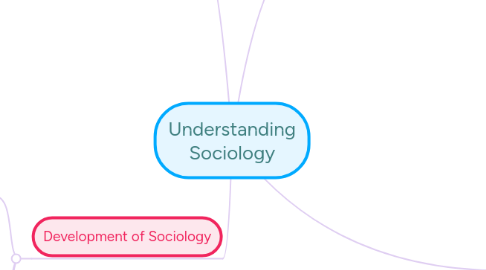
1. Sociology?
1.1. The study of human behaviour in society.
1.2. A scientific way of thinking about society and its influence on human groups.
1.3. A system of social interaction that consists of one or more social groups that include shared and distinct culture and social organization.
2. Development of Sociology
2.1. Early Thinkers
2.1.1. Auguste Comte
2.1.1.1. Father of Sociology (French)
2.1.1.2. Theoretical science of society
2.1.2. Harriet Martineau
2.1.2.1. Insights on customs on social practices
2.1.2.2. Social class distinctions
2.1.3. Emile Durkheim
2.1.3.1. Religion reinforces group solidarity
2.1.3.2. Anomie- Loss of direction in a society
2.1.4. Max Webber
2.1.4.1. German Sociologist
2.1.4.1.1. Verstehen- understanding
2.1.5. Karl Marx
2.1.5.1. German Social Scientist
2.1.5.1.1. Modern Sociolism
2.1.5.1.2. Communism
2.1.5.1.3. Marxism
2.1.5.2. The Exploter
2.1.5.3. The Exploited
2.2. Where
2.3. Form
2.3.1. Essay exam
2.3.2. Oral exam
2.3.3. Multiple choice
2.4. Don't forget to...
3. Sociology & Social Science
3.1. Less advanced
3.1.1. Scientific method is newly introduced
3.1.1.1. Name
3.1.1.2. Office hours
3.1.1.3. Contact
3.1.2. Sociologist are dealing with human beings - subjects that constantly change their behaviours.
3.2. 2 types of analysis
3.2.1. Macro Analysis
3.2.1.1. Study large patterns of sociol interaction that are vast, complex.
3.2.2. Micro Analysis
3.2.2.1. Study patterns of social interaction that are small, less differentiated
3.3. Sociology can be seen in
3.3.1. Economics
3.3.1.1. Goods & Services.
3.3.2. Psychology
3.3.2.1. Human mental process
3.3.3. Political science
3.3.3.1. Politic behaviour- government
3.3.4. Anthropology
3.3.4.1. Entire/ small scale primitive society

